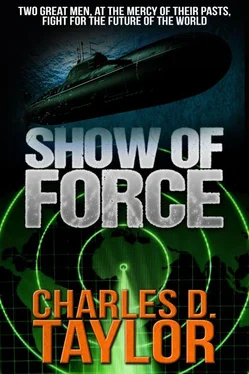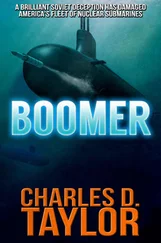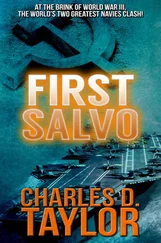There had not been reports of many helos by Soviet intelligence, let alone of trained marines. They were gunships. Combined with the marines on shore, they offered more firepower and maneuverability than the Soviets could handle. The boats not already on shore were strafed. The troops that had made it to the beach were hit with rocket fire from the air and a variety of small arms from the defenders.
It was over quickly. When the major in charge of the marine detachment was sure his men could clean up the remnants of the Russian force, the helos were released to chase the submarines that had brought the landing force. But the silent black boats had slipped away as soon as they saw there would be nobody to bring home.
Upon receipt of the proper signal from Moscow, the submarine on the southeast of the Gulf of Oman had proceeded on a north-northwest course to the Strait of Hormuz. On arrival at a preset location, it carefully seeded the Strait with its new mines. No ship could now enter or depart the Persian Gulf.
During all this efficient operation, there was only one item overlooked. A junior communications officer was to have notified all ports in the Persian Gulf that Russia suspected an American sub had seeded the Strait. Later investigation seemed to settle on the fact that an announcement the next day at the United Nations would be time enough. No one bothered to check ship departures;
The S.S. Prince of Peace, of Liberian registry, was one of the two largest ships to ever sail the oceans of the world. When fully laden, she contained 750,000 tons of oil spread equally in her five giant tanks. She was over 1,400 feet long, more than a quarter of a mile, and her beam measured 240 feet, only twenty yards less than a football field. Her most impressive statistic was hidden when she was fully loaded, for the Prince of Peace spread below the surface of the ocean like an iceberg with her 100-foot draft.
She was truly a supertanker in every respect, and her full capacity of oil could have supplied all the energy needs to sustain a substantial city for more than a year. Her oil rode in the forward 95 percent of the ship, while her after 5 percent housed her small crew in absolute luxury. Her pilothouse was as spotless as an operating room and as automated as the Concorde jet.
The Prince of Peace had taken on her oil fifteen miles out from the port of Bahrain, simply because she could get no closer to the city. Safety experts had agreed these supertankers should be far enough away to avoid endangering the population. Resupplied by helicopter, she stood out into the Persian Gulf the morning before the mines were slipped below the surface of the Strait of Hormuz. Giant propellers bit into the warm water, but her sheer weight prevented the ship from gaining her economical cruising speed of fourteen knots for the better part of half an hour. While her speed through the water was unimpressive compared to the faster military ships, an urgent attempt to stop her would still cause the ship to remain in forward motion for over six minutes.
First light was just coloring the sky as the Prince of Peace was passing through the coral reefed strait toward the safety of deeper water and open ocean. The tremendous vibrations of the hull passing through the water activated two of the mines. The navigator had just appeared on the wing of the bridge to take his first star sight when the initial explosion shattered number-one tank in the bow. From one hundred feet above the water's surface and over thirteen hundred feet astern of the explosion, the navigator was fascinated most by the amount of time it took the sound to arrive. Before he could ponder the physics of the problem further, the second mine detonated under tank number three.
Enough volatile gas had collected in the few air spaces in the tank- to instantly create a secondary explosion far beyond any that the designers of the mine could have comprehended. The navigator was never aware of the secondary blast, nor were any other members of the crew. The force buckled the hull, lifting the central section up, the weight fore and aft snapping the ship in half, the hull for a moment resembling a cracked egg.
Then a fireball rocketed skyward, fueled by the gases generated by intense heat. As it rose, more oil was sucked up with it, both from the number-three tank and those on either side as they ruptured. The first streaks of dawn were instantly changed into midday on the coasts on either side of the strait. The heat that arrived shortly after the light was so acute from its point of origin that for a moment It was as if the midday sun had stalled.
Steam from the ocean followed the fireball as it soared skyward, helping to intensify the winds now developing in the vortex of the flame. While the Prince of Peace was already settling in two vast, partially melted sections, the oil from all five burst tanks was now burning furiously. Where hardly a breath of air had existed a moment before, winds were now increasing in a circular motion, fanning the flames and drawing more oil and oxygen into the fire. Not a minute had passed before this firestorm had developed hurricane-force winds, encouraging a blaze unlike any man had ever thought of creating, beyond even Dresden or Hiroshima.
Later in the day, the dense, smoky, oil-laden clouds would drift eastward, creating a black rain that would cover the southernmost tip.of Iran, reaching across the border into Pakistan. There would be little fishing for years to come and the blackened shores on both sides of the strait and the Gulf of Oman would reflect the disaster for an equal amount of time.
The loss of a freighter, or even a small tanker, might not have created as much furor around the world as this one unexpected mistake in communications. Within hours, the nations of the world — First-World, Second World, Third World — were clamoring for a halt in this sudden war between the two world powers, a war over a misunderstood plot of guano in the Indian Ocean.
The concept first appeared on wall posters in Peking only hours after the loss of the Prince of Peace, which had followed on the heels of the unfortunate Soviet landing at Islas Piedras. There was no longer concern about security of communications either in Moscow or Washington. Their losses had been tremendous. Che world was only too well aware of the danger that now existed. The wall posters stated:
A blatant message has been sent to the peaceful nations of the world that the two superpowers are willing to go to any length to establish superiority over the other, including hazarding the hegemony of Third World countries in their own affairs. If they are not willing to come to the peace tables within twenty-four hours, then it is time for the remainder of the world to bring them to their knees.
Peking saw the chance. Once and for all, Russia would be established as a dangerous aggressor. And the United States would have to listen to China now, instead of assuming a big brother role.
While other world leaders might not have interpreted Peking's basic reasons, they were willing to add their names to the list. Moscow and Washington were overwhelmed by the anger directed at them.
FROM THE LOG OF ADMIRAL DAVID CHARLES
I have won. They will not get to Islas Piedras. Alex has won. He proved that the Soviet fleet can stand against us, toe to toe. Nobody has won. We have simply proven that we can hammer each other into a surreal state without the use of nuclear weapons. Maybe if we had used the atomic warheads and hit the other's capital ships first, there would not have been such unacceptable loss.
I feel like Chief Joseph. He was correct. He should be considered the great American, and maybe he would be if people had only listened to him. He said he would fight no more. He was a man of wisdom. He was also shouting into a hurricane, for his words were carried away before he could be understood. He knew.
Читать дальше












